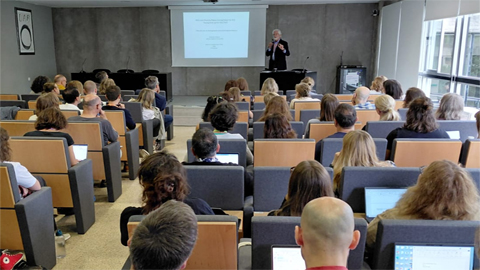The UAB hosts the International Divorce Conference
The Bellaterra campus hosted the 23th edition of the International Divorce Conference on Thursday and Friday 9 and 10 October 2025, organised by the Centre for Demographic Studies of the Faculty of Arts & Humanities. This academic meeting takes place yearly and has become one of the most important events in the study of separations and family transformations. A total of 70 researchers from 15 countries participated in this year's edition.

Researchers discussed issues such as the effects of joint custody on children, the increase in divorce rates among older couples, and co-parenting according to gender.
The Divorce Conference 2025, which took place at the Faculty of Arts & Humanities of the UAB, on the Bellaterra campus (Cerdanyola del Vallès), is an initiative of the European Network for the Sociological and Demographic Study of Divorce. The conference aims to cover research that addresses any aspect of the dissolution of marriage, including its causes, processes and consequences for women, men and children.
The congress began with a speech by prestigious sociologist Andrew Cherlin, professor at Johns Hopkins University (United States) and one of the most internationally recognised voices in the study of marriage, divorce and family. Cherlin, a renowned expert in the sociology of family and author of books such as The Marriage-Go-Round, opened the conference on Thursday 9 October with the conference “Why Are Divorce Rates Going Down for the Young and Up for the Old?”, in which he analysed the paradoxical evolution of divorce rates in Western societies.
In his speech, Professor Cherlin explained how divorce rates have evolved over recent years, depending on the fertility rates of the baby boom generation, the health of the economy, globalisation, or the increase in the educational level of the population (especially that of women).
Over the course of two days, prominent specialists such as Christine Schwartz (University of Wisconsin-Madison), Pamela Smock (University of Michigan), Anne-Rigt Poortman (Utrecht University), and Dimitri Mortelmans (University of Antwerp) debated key issues such as joint custody and its effects on children, gender differences after separation, the economic and social consequences of divorce in old age, and the influence of educational and cultural inequalities in the dissolution of marriages. Aspects such as the impact of divorce on health and employment and the growing role of new family forms and household recompositions were also analysed.
The congress offered an X-ray of what is happening in the world regarding the transformation of families when a divorce occurs. Case studies from different countries were presented that allowed for a comparison of different realities, from Sweden to South Korea, Spain, Norway, Japan and Canada.
The conference opened a debate on a phenomenon that affects more and more areas of social life and that poses key challenges in terms of public policies and family coexistence.